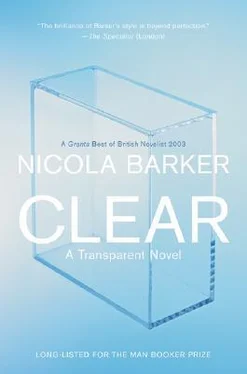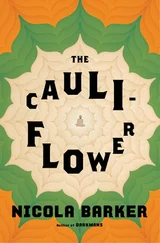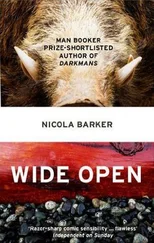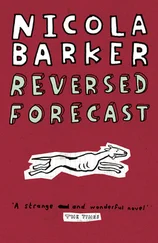It becomes increasingly apparent how important Jews have been to Blaine from the start. His hero — Houdini — was the son of a rabbi. Blaine’s first big break? Being booked to do magic at a bar mitzvah when he was eighteen, and meeting the hugely wealthy and influential Steiner family who whisk him away to St-Tropez for the summer and teach him everything he could ever possibly want to know about money. And socialising. And glamour (he totally changes his image , at this stage, shaves his head, grows the goatee, dresses in black…I guess you could say it was a ‘Jewish look’.)
To show need , he soon learns, is never a good thing.
But he kind of knew this, already. When he worked at a restaurant (this macrobiotic joint he went to in order to try and learn how to cook healthy food for his — by then — very sick mother) he used to perform tricks for all the customers there, and if they gave him a big tip, he’d often hand it straight back. He wasn’t doing it for the cash, see? He was doing it to ‘bring mystification’, because people are at their most beautiful when they’re at their most vulnerable , apparently.
He actually said that.
I’m reading the book backwards, Chinese-style, and it’s when I get to the beginning that I finally hit gold. It’s then that I see the photographs. Two photographs. In quick succession.
The first is of Houdini, Blaine’s hero. Blaine says (underneath) how it was as a direct consequence of seeing this particular photo (in the library, when he was five) that all his subsequent interest in magic was spurred.
I inspect the photo very closely.
It’s scary.
Houdini is straitjacketed and his legs are tied. He is balanced, precariously, on the edge of a high rooftop (or perhaps a bridge), and he seems to be holding on to that ledge only by dint of his chin , which is hooked (resolutely) around a metal strut.
Blaine says it was the eyes that initially fascinated him. The eyes are desperate. Staring. Frantic (in fact so mesmerised was Blaine by the look of Houdini’s eyes in this particular photograph, that he actually had them tattooed on to his own arm when he grew up).
It’s an exciting image. Melodramatic. Kinky , even.
I try to enter the mind of the 5-year-old Blaine. A father dead, a doting but hardworking mother, a sharp intelligence (Aged three he developed a passion for chess. His mother took him to the local parks where he challenged all the old geezers at the game), and this powerful, this overriding sense of physical precariousness.
They moved around a lot. One of his abiding memories of childhood, he says, was of staring backwards over his mother’s shoulder as he was hurried away from a burning apartment block. ‘For some strange reason,’ he says, ‘the buildings we were living in always burned down.’
(Yup. I know what you’re thinking. ‘ Eeeek ! Shades of The Omen .’)
And the second image? The second photograph? It’s an early family shot. Nineteen seventy-five. A 3-year-old Blaine and his mother posing on a New York street together.
She’s glamorous. Like a model. But smart-seeming, too. For the benefit of the photo she has hauled the baby Blaine on to one of those New York newspaper dispensers. She is staring at him (mouth slightly ajar from the effort of lifting him up there, head still tipped back as she struggles to sit him still ).
And Blaine? Looking confidently towards the camera. Holding his mother’s knitted hat (with such delicacy and precision ) between two tiny hands. Rotating it. Getting to grips with it. One hand flattened, as if he might — if he chooses (and definitely not, otherwise) — draw a small bird, or a pack of cards, or a bunch of those crazy artificial flowers which magicians used to favour so heartily in the seventies from the pale fabric of that most-esteemed piece of woolly head-apparel.
Now here’s the shocking thing: Blaine has the exact same eyes as Houdini on the rooftop. Fact . Even then, aged three (I flip back and forth. Yup ).
It’s as if Uri Geller was here, playing one of those mind-games where he tells his victim to draw ‘anything you want’ on to a piece of paper, and then, five minutes later, when the secret image is finally revealed, he opens his own piece of paper and has drawn precisely the same thing (Then he goes one step further and holds them together — front to back — and you can see through the paper that they are exactly the same size. The proportions are identical. That’s how similar they are).
Houdini’s eyes are full of fear, but those baby eyes? Haughty. With just a whiff of hostility (who’s taking this picture? His father? A new friend? A relative? Does it matter? Because the tiny boy Blaine is fiercely protective of his mother. This is her hat , his expression says, and she’s my mother, so who the hell are you, eh ?’).
Tiny nostrils flared. Chin lifted.
I smile at his boyish defiance.
It’s then — and only then (when my eye is idly inspecting the newspaper dispenser — that I notice his little legs, and the small, supportive, metal and elastic harness there. The left leg relaxed. The right leg kicked out slightly, under the stress of the wire.
Mystery and suffering. Mystery and suffering .
Bly’s words rush back to me.
I really need to share. I do . But I don’t dare phone Jalisa. And Bly will say I Told You So. And Solomon will just scoff and sneer…
Aphra’s in a towering rage (we’re talking 30 storey) when she finally gets around to answering her buzzer (‘ What ?! Who ?! Oh for Christ’s sake . Just come up ’), and she hasn’t calmed down much by the time I’ve staggered up there. Her front door has been wedged open with a phonebook and she’s in her tiny kitchen, throwing stuff around and cursing.
‘What’s wrong?’ I ask, peering tentatively in (she’s dressed in a beige, rough linen, deep-pocketed miniskirt, an expensive-seeming red V-neck sweater — and some antique red Scholl sandals with thick, flat wooden heels. Her hair’s pulled back into a chaotic bun. Hairpins shoved in everywhere).
‘The bloody…’ she kicks the cooker and her sandal flies off. ‘ Fuck . Something’s blown . A wire. A fuse . I don’t know. But I’m halfway through making dinner…’ (or several dinners- from what I can tell- since all the worktops in that tiny space are literally crammed with bowls and boards and mixers).
She tries to bully me into fixing it.
‘How many wires can there be ?’ she asks indignantly (when I try to tell her that this electrical lark isn’t really my forte). ‘I mean there’s just a big, fat one at the back. How complicated is that ?’
‘I could get you a takeaway,’ I offer.
She turns and looks at me, furiously. ‘What do you know…’ she splutters, and then suddenly, the stress in her face simply falls away and she just grins .
‘Adair Graham Mac Kenny ,’ she says, holding out her arms (as though expecting me to jump into them, like an enthusisatic young pup ). ‘Long time no see, eh ?’
She kisses me, with tender ceremony, on either cheek.
(No hard feelings about the other night, then?)
Even through the immaculate veneer of her sudden cheerfulness I can tell that she’s exhausted. It’s only been a week or so, but she looks thinner. And the whites of her eyes are pinky-red. She seems a little high. Medication? Stress? Exhaustion?
‘But what will I do ?’ she asks, pointing towards the chaos on the counter.
Читать дальше
Конец ознакомительного отрывка
Купить книгу












